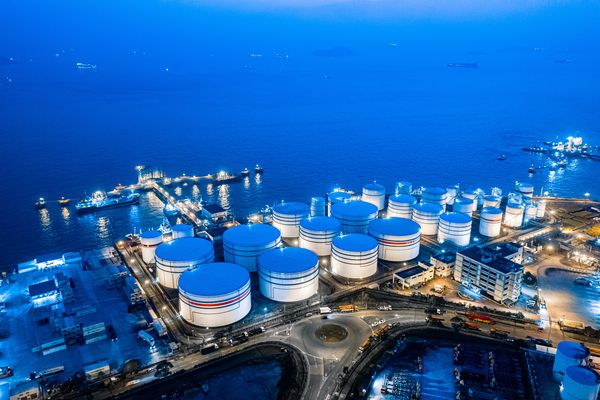Phillips 66 (PSX +2.22%) is one of the largest independent refining companies in the country. However, while it's known most for its refining business, Phillips 66 is so much more than just that one business. In fact, it's the non-refining businesses of chemicals, midstream, and marketing and specialties that have kept it in the green during the refining sector's recent challenges. Further, those segments hold the company's most compelling growth prospects, which is important given that the refining industry doesn't have much growth ahead of it.
Phillips 66 101
Phillips 66 owns stakes in 11 refineries around the U.S. and two in Europe that have the capacity to refine a net 2.2 million barrels of oil per day. For perspective, that refining portfolio is behind market leader Valero Energy (VLO +4.48%), which owns 15 facilities in the U.S., U.K., and Canada that have a combined net capacity of 3.1 million barrels per day. However, despite its smaller refining business, Phillips 66's enterprise value is $50 billion, while Valero's is just $33 billion.

Image source: Getty Images.
Phillips 66 is a substantially larger company than Valero because of its diversification. For example, the company's chemical's segment consists of a 50% stake in CPChem, which it co-owns with Chevron (CVX +0.91%). The $13.6 billion chemicals company is the world's largest producer of polyethylene and the fourth-largest ethylene producer in North America. Meanwhile, the Phillips 66/Chevron joint venture is about to get a lot bigger because it's investing $6 billion in the expansion of its petrochemicals manufacturing capacity by building two more polyethylene units and a world-scale ethane cracker plant along the Gulf Coast.
Meanwhile, Phillips 66 controls a large integrated midstream network. The company's assets include both crude oil and refined product pipelines and terminals as well as several NGL-related assets. In addition to that, the company owns sizable stakes in two MLPs: DCP Midstream (DCP +0.00%) and Phillips 66 Partners (PSXP +0.00%).
Finally, the company's marketing and specialties segment distributes gas and diesel in the U.S. and Europe to more than 8,750 branded outlets, while also controlling the largest aviation fuel network in the country. In addition, the company also manufactures and markets specialty products, and it's one of the biggest finished lubricant suppliers in the country.

Image source: Getty Images.
Why this diversification matters
One reason Phillips 66 likes having a diversified business mix is because of its view on the refining sector. CEO Greg Garland detailed that outlook on the company's recent first-quarter conference call, saying:
I think refining is a good business. It's just, long-term, I just don't see it growing. I think that we've seen some decent gasoline demand growth over the last two years in the U.S. but, ultimately, I think there's just too many factors that are going to hit you in terms of efficiencies of vehicles.
Because of the belief that refining is a no-growth business, Garland stated that "to invest in refining to add capacity still doesn't make sense to us." Instead, where the company will make refining investments is to reduce its cost structure by increasing its ability to process cheaper oil.
The company has clearly put its money behind that view, only investing $317 million of its combined $3.7 billion capital budget into growth-focused refining projects this year. Instead, the bulk of its capital dollars will go toward the chemicals expansions with Chevron and midstream growth projects on its balance sheet as well as through both Phillips 66 Partners and DCP Midstream. In fact, of the $2.37 billion in capital Phillips 66 and its affiliates will invest in growth projects this year, $1.5 billion will fuel midstream growth.
That segment will likely continue commanding a significant portion of the company's growth capital in future years. That's not only because it doesn't see refining as a growth business, but it's wrapping up its chemicals growth projects with Chevron later this year. That said, the other primary driver of midstream growth is the steady supply of compelling projects that come its way.
For example, earlier this year, DCP Midstream signed on to be a partner with Kinder Morgan (KMI +0.66%) on a proposed natural gas pipeline project from the red-hot Permian Basin to the Gulf Coast. Initial bids for capacity on the project significantly exceeded the planned capacity, which could lead Kinder Morgan and DCP Midstream to build a larger project than the $1 billion pipeline they initially pitched to shippers. Meanwhile, Phillips 66 is developing an oil pipeline in the region that would move crude in the same direction. Finally, Phillips 66 Partners announced that it's developing a new isomerization unit at one of Phillips 66 refineries to help it produce more volumes of high-octane gasoline. The project could cost up to $200 million if approved early next year. What these potential projects demonstrate is that Phillips 66 still has plenty of midstream growth ahead of it.
Investor takeaway
As one of the largest independent refiners in the U.S., many investors simply lump Phillips 66 in that category. However, there's a lot more to the company than just refining, since it also controls meaningful chemicals, midstream, and marketing and specialties businesses. These segments are what will drive the company's growth over both the short and long term, especially since it doesn't view refining as a growth business.








